|
|
|
Sort Order |
|
|
|
Items / Page
|
|
|
|
|
|
|
| Srl | Item |
| 1 |
ID:
181048
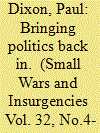

|
|
|
|
|
| Summary/Abstract |
There are contrasting interpretations of the Northern Ireland peace process which have competing implications for the lessons to be drawn from the conflict. This article offers a Constructivist Realist critique of three leading perspectives on the peace process: Neoconservative, Cosmopolitan and Conservative Realists (or Consociationalists). The Neoconservative perspective emphasises the importance of security policy in defeating terrorists before negotiations. By contrast, Cosmopolitans and Conservative Realists emphasise the importance of constitutions and tend to ignore security. Constructivist Realists argue that all three accounts are over-generalised, provide inadequate understandings of politics and, therefore, the relative success of the peace process.
|
|
|
|
|
|
|
|
|
|
|
|
|
|
|
|
| 2 |
ID:
138909


|
|
|
|
|
| Summary/Abstract |
In the late 1950s, when Iran was witness to the withering away of social norms and everyday practices concomitant with the country's rapid urbanization, a group of young Iranian film directors embarked upon a new cinematic trend, in attempts to screen the ethereal quotidian of Iranian life. Defining itself against what was perceived to be the “cheap” and “repetitive” commercial “Film Farsi” industry of the time, this alternative (alter-)cinema fused the local and global, by incorporating international cinematic elements in socially and politically conscious national films, and projecting them on local and international screens. Problematizing a homogeneous conception of historical time that subsumes the history of cinema into a conventionalized grand narrative of the Iranian 1979 revolution, this article works with a conception of heterogeneous historical time that first interrogates cinematic temporality autonomously and then in relation to the political history of Iran, especially the events of the 1978–79 revolution. This article explores how the distinct cosmopolitan alter-cinema of pre-revolutionary Iran was born from a cinematic rupture in the 1950s, prompted by series of critiques and professional expectations that colored the attention paid to the vernacular and quotidian in film production.
|
|
|
|
|
|
|
|
|
|
|
|
|
|
|
|
| 3 |
ID:
106625


|
|
|
|
|
| Publication |
2011.
|
| Summary/Abstract |
Although the impressive diversity of the World Social Forum (WSF) is regularly noted, there has been little analytical work done on the degree to which the praxis of the WSF is enabling communicability across previously unbridged difference and how relations of power, particularly the coloniality of power, shape these interactions. Based on extensive participant observation at the WSF, this article analyses the 'open space' of the WSF as a 'contact zone' that, in different facets of this complex praxis, is both cosmopolitan and colonial. The author employs the differing conceptions of the contact zone, drawing on the work of Boaventura de Sousa Santos and Mary Louise Pratt, in dialogue with notions of coloniality and colonial difference arising from Latin American studies to illumine the analysis.
|
|
|
|
|
|
|
|
|
|
|
|
|
|
|
|
| 4 |
ID:
160444
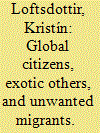

|
|
|
|
|
| Summary/Abstract |
This article reflects on Europe’s problematic relationship with its ‘others’, asking in particular how the idea of the ‘exotic’ – constituting one of Europe’s ‘imperial ruins’ – intersects with the figure of the Muslim migrant. The Muslim migrant has in the present become in Europe a potent marker of otherness, which reflects how some cosmopolitan aspirations are perceived negatively in European discourses, revealing how mobility itself is racilized and gendered. WoDaaBe Fulani migrants from Niger have historically occupied a subject position in Europe as identified with ‘the exotic’. The article discusses WoDaaBe temporary migration to Europe to supplement their income back home, and their intersecting positions as ‘exotic’, as Muslims and black Africans. While contemporary discourses tend to highlight Europe’s status as a site of equality, human rights, and cradle of civilization, some bodies are welcome within the space of Europe while others are not.
|
|
|
|
|
|
|
|
|
|
|
|
|
|
|
|
| 5 |
ID:
142707


|
|
|
|
|
| Summary/Abstract |
This article examines the cosmopolitan world of the colonial zenana through the marriages of two mid-twentieth-century royal Indian women, Maharani Brijraj Kumari of Dhrangadhra and Maharani Krishna Kumari of Jodhpur. In particular, it analyses the close connection between zenana women's education and emergent adolescent sexuality. These women ordinarily began their studies in mixed-gender classrooms with their brothers and male cousins as children. As they neared the age of menarche, girls were extracted from the formal schoolroom and undertook instruction in household management and childcare in preparation for their expected roles as wives and mothers. Despite being prematurely cut off from the childhood classroom, women's educational backgrounds (in both Western and Indic forms of knowledge) and future learning potential remained an important part of their postmarital identity. Young, anglicized Indian men increasingly desired wives who reflected the modernity that they hoped to represent as imperial subjects and were encouraged to adopt by British advisors and tutors. They required wives who would not wear pardah and thus reflect more Western ideals of companionate marriages of friendship, yet simultaneously live in gender-segregated palace quarters, uphold traditional kinship networks, perform religious duties, and engage in the maintenance of a large polygamous household. Definitions of sex, marriage, and domesticity were increasingly cross-cultural and pan-historical in nature, incorporating aspects both of the ‘modern’ and the ‘traditional’, the Indic and the European, the regional and the transnational.
|
|
|
|
|
|
|
|
|
|
|
|
|
|
|
|
| 6 |
ID:
129977
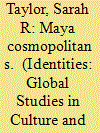

|
|
|
|
|
| Publication |
2014.
|
| Summary/Abstract |
Maya heritage is embraced throughout Yucatán as a crucial component of tourism promotions. This, coupled with an emphasis on multiculturalism, makes the state itself a local actor in the marketing of Maya identity through the creation and funding of community-based tourism projects. This article discusses the shifting role of the state in shaping these communities, referencing a Maya village in the Mexican state of Yucatán as the context. The aim is an understanding of the articulation of local tactics to conceal cosmopolitanism while remaining competent in the eyes of funding agencies and the strategies employed by the state that reinforce the importance of performance for tourists. The desire on the part of state creates situations in which individuals are expected to exist in concurrent states of authenticity and modernity, as both traditional and cosmopolitan.
|
|
|
|
|
|
|
|
|
|
|
|
|
|
|
|
| 7 |
ID:
153742
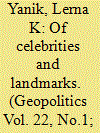

|
|
|
|
|
| Summary/Abstract |
This paper analyses the (re)production of Turkey’s liminal-hybrid representations through a combination of sports and music celebrity interventions on a specific landmark. It shows that a country’s representations can be reinforced and reaffirmed with the help of celebrities performing their talent on landmarks such as the Bosphorus Bridge and (in some cases) placing another landmark – Ortaköy Mosque – in the backdrop. Combined with the role of celebrities, these two landmarks that have come to symbolise Turkey’s liminality and hybridity visually, in a very mundane manner, aim to add a cosmopolitan component, a banal one though, to the national identity. This further shows that national identity is not always made and shaped by the citizens of that country, but rather foreigners can actively contribute to certain elements of an identity. The paper also draws attention to the role of the states in the making of celebrity politics, refocusing the attention from politician celebrity interaction to state and celebrity interaction.
|
|
|
|
|
|
|
|
|
|
|
|
|
|
|
|
| 8 |
ID:
120786
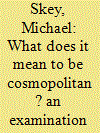

|
|
|
|
|
| Publication |
2013.
|
| Summary/Abstract |
The literature on cosmopolitanism has mushroomed in the past decade or more as attempts are made to theorise new patterns of mobility, interactions between previously distant social groups and the emergence of institutions to manage these processes. In this paper, I build on the arguments of those who have emphasised the strategic aspects and temporal dimensions of cosmopolitan expressions and practices, by focusing on the resources and constraints that different actors operate with, or under, and, as a result, the varying commitments they have to different 'others'. Using this type of grounded approach, a number of Illustrative examples from a study of social identities in England are then analysed and used to theorise cosmopolitanism, as a perspective that is periodically articulated, in relation to specific needs, contexts or prompts, rather than being an inherent property of particular individuals, groups or situations.
|
|
|
|
|
|
|
|
|
|
|
|
|
|
|
|
|
|
|
|
|